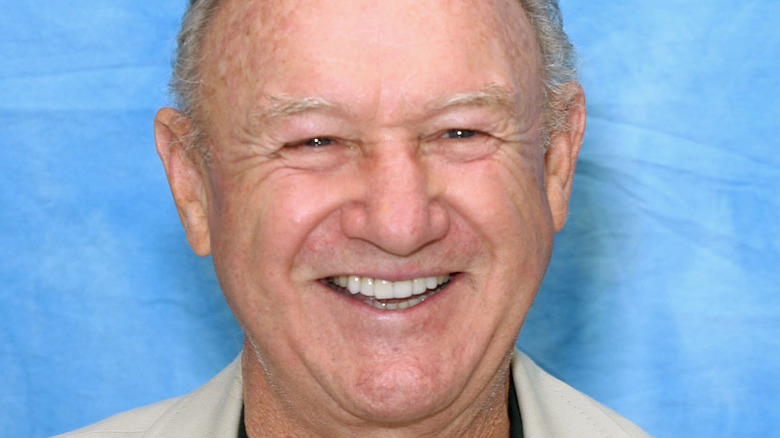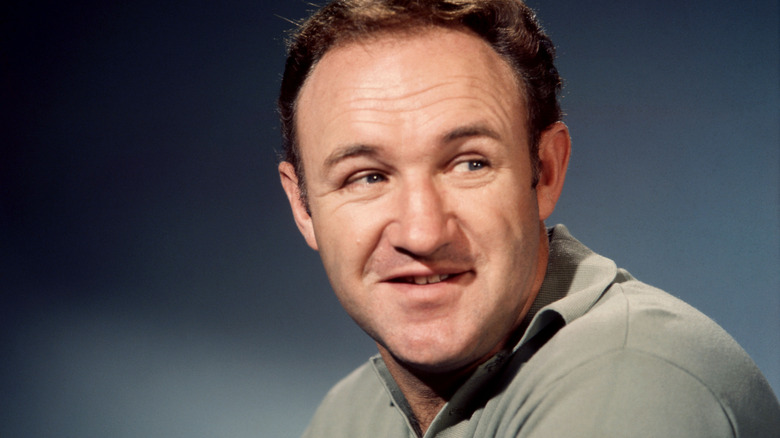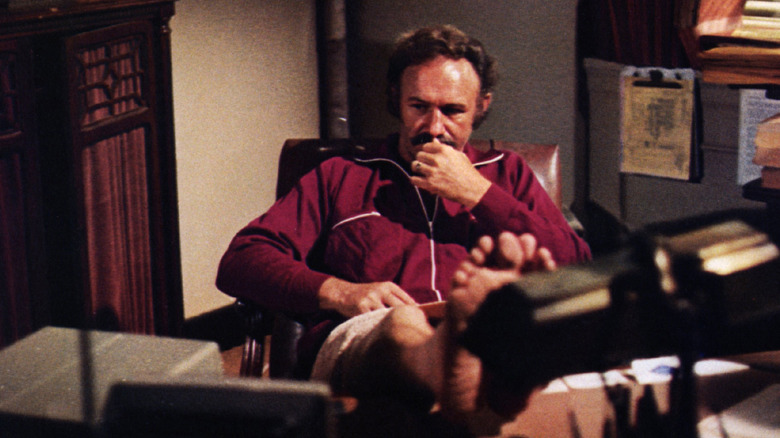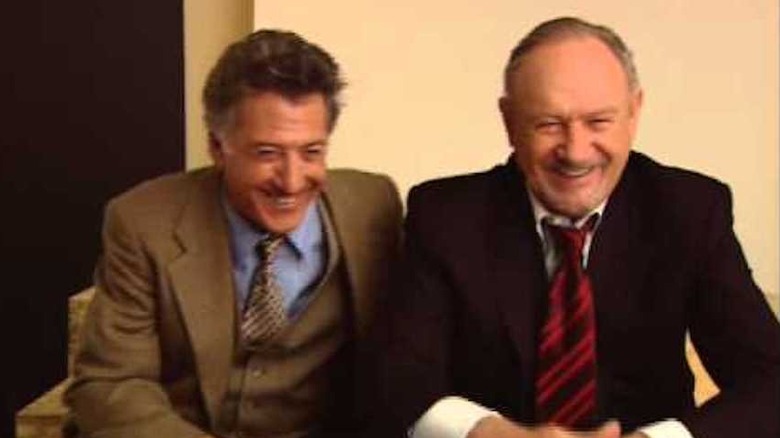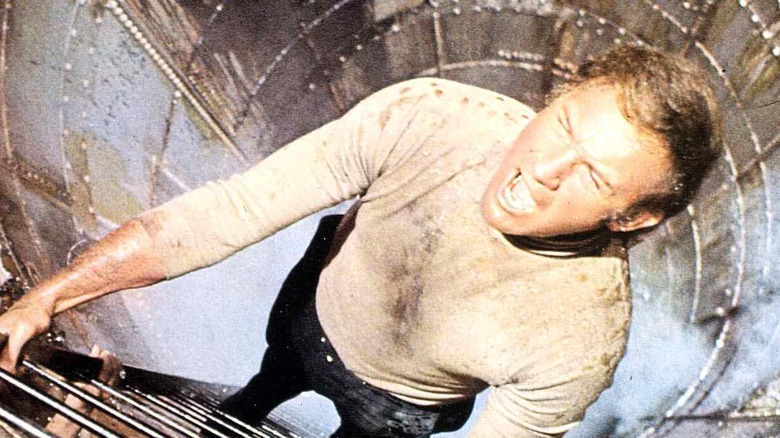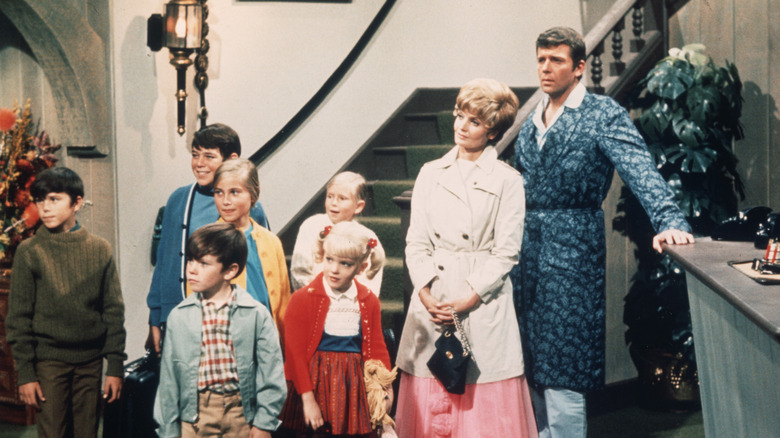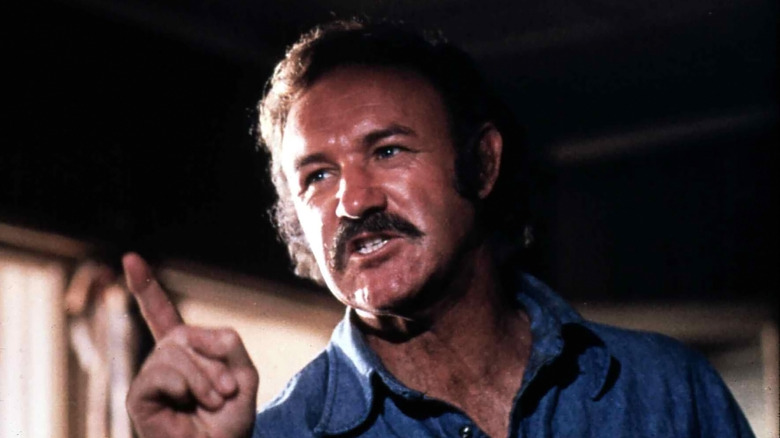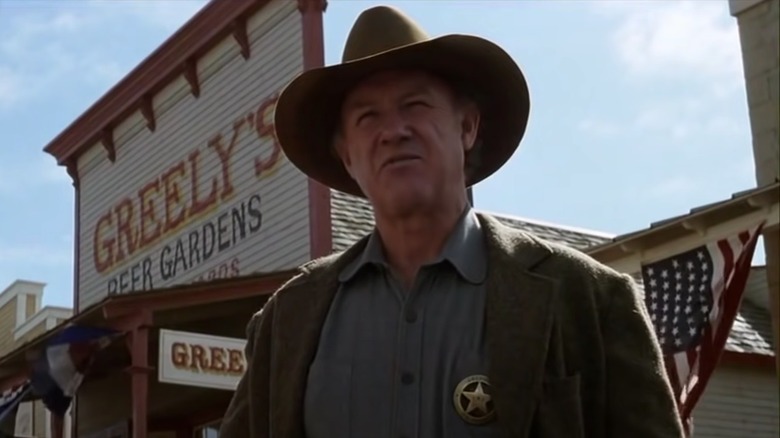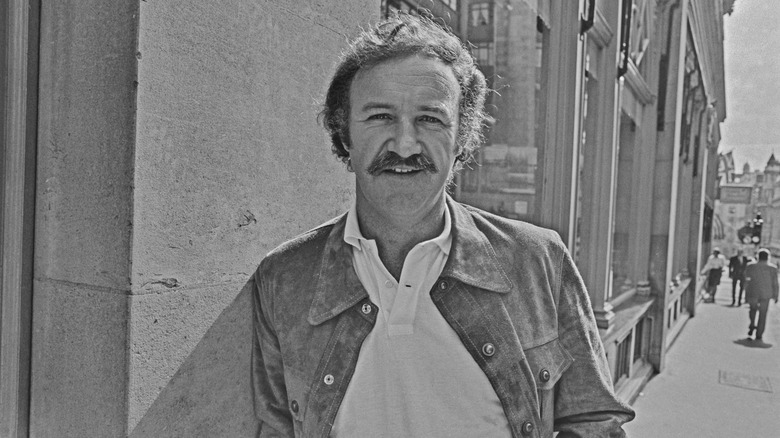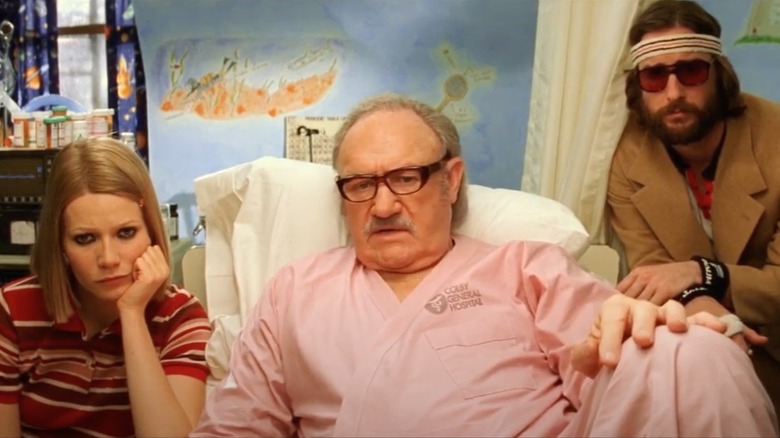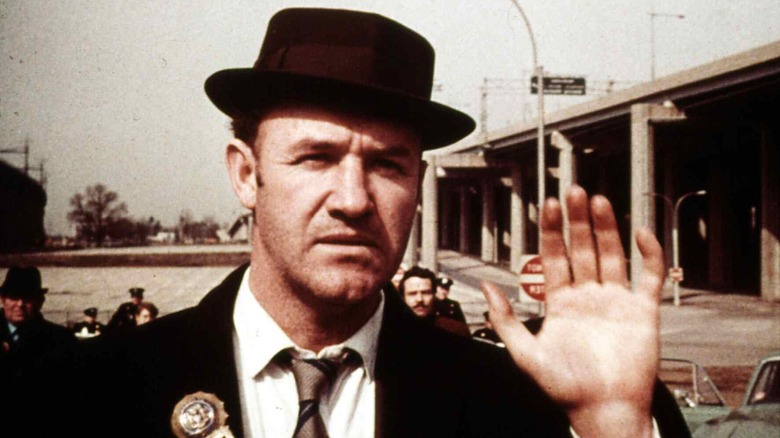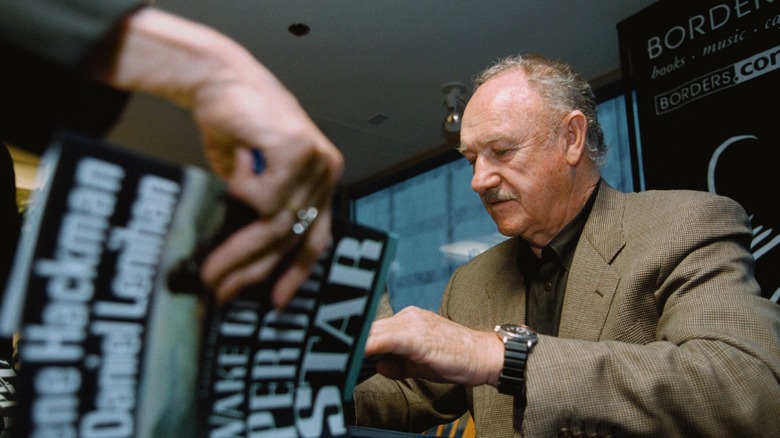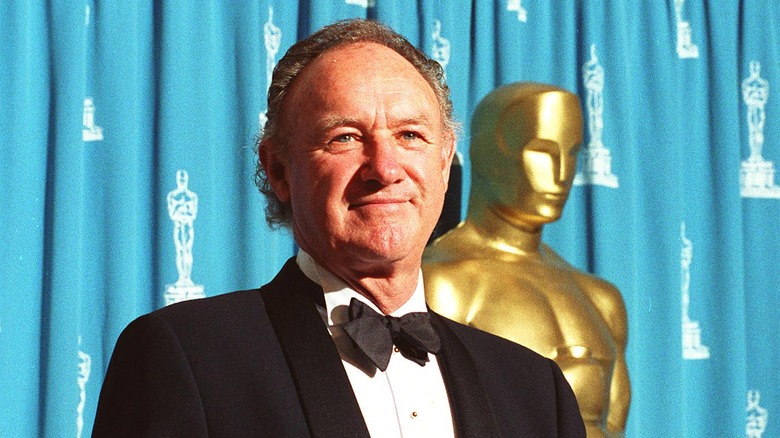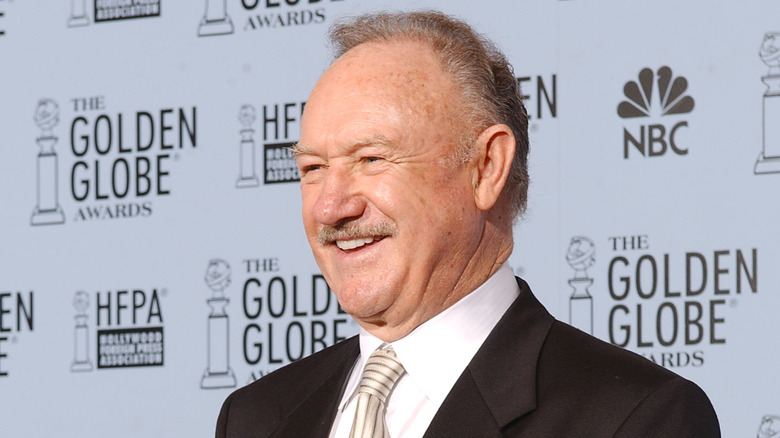Things You Never Knew About Gene Hackman
By all accounts, Gene Hackman should never have become a movie star. Lacking the square-jawed, matinee-idol looks typical of Hollywood leading men, Hackman bucked that trend by bringing the training and versatility of a character actor to leading roles. As a result, film buffs have been able to enjoy some of the most dynamic and incendiary performances ever committed to celluloid, ranging from hard-boiled New York police detective Jimmy "Popeye" Doyle in "The French Connection" to a sadistic lawman in "Unforgiven," from a paranoid surveillance expert in Francis Ford Coppola's acclaimed film "The Conversation" to sly supervillain Lex Luthor in the "Superman" franchise.
In 2004, after the release of the comedy "Welcome to Mooseport," Hackman disappeared from Hollywood. Unlike many Tinseltown retirements, though, Hackman's has stuck; true to his word, he has not acted against since then, instead enjoying his golden years the way he'd always navigated his career — on his own terms.
Despite his absence from the screen, the actor — who celebrated his 92nd birthday in January 2022 — remains a formidable presence thanks to the cinematic legacy he left. To find out more about this legendary Hollywood heavyweight, read on to discover what you never knew about Gene Hackman.
Gene Hackman enlisted in the Marines when he was 16
Gene Hackman didn't have the easiest childhood. He was just 13, when his father walked out on him and his mother. As Hackman recalled for The New York Times Magazine, the last time he saw his father, he offered a wave as he drove away. "That wave, it was like he was saying, 'OK, it's all yours. You're on your own, kiddo,”" said Hackman.
Just a few years later, Hackman lied about his age in order to enlist in the Marines. "I left home when I was 16 because I was looking for adventure," Hackman told Time. As Military.com recalled, Hackman served mainly as a radio operator, stationed in such far-flung locales as China and Hawaii. It became evident that Hackman wasn't really cut out for military service, given that his ongoing issues with authority led him to be demoted no less than three times for exiting his post without authorization. "I was not a good Marine," he admitted to Larry King in a 2004 interview. "I made corporal once and was promptly busted."
As the Independent noted, his tenure in the Marines came to an end when he crashed his motorcycle and became badly injured, breaking a shoulder, a knee and his right leg. As a result, he was deemed unfit for active duty and was discharged.
Working as a doorman in NYC became a 'turning point'
Following his stint in the Marines, recalled the Independent, Gene Hackman decided to study journalism at the University of Illinois, but quit after just six months. That was when, at age 22, he headed for New York to follow his lifelong dream of becoming an actor. ”From the time I saw my first movie as a boy, I wanted to be an actor,” Hackman told The New York Times Magazine.
Those early months in New York were characterized by struggle. During this period, Hackman toiled at a series of low-level jobs while living at the YMCA, including driving trucks, working at a drugstore, moving furniture and even selling candy door to door. The least favorite of all his jobs, he admitted, was working the night shift at the Chrysler Building, "polishing leather furniture."
He was employed as a doorman at a hotel in Times Square when a figure from his past happened to walk past — it was his former Marine drill instructor. "He never looked at me but muttered, 'Hackman, you're a sorry son of a bi**h,'" Hackman told David Letterman (via the Independent). ”That was a turning point for me,” Hackman recalled in an interview with The New York Times. ”I was so embarrassed by what I was doing in New York. And the fact that somebody cared enough to say something like that.”
He and Dustin Hoffman studied acting together
Hackman eventually wound up in California, studying at the Pasadena Playhouse. "I was not considered one of their most promising students," he deadpanned in an interview with Connoisseur, via Deseret News. During this time he became friendly with another acting student, Dustin Hoffman. ”He wore a suede vest with no shirt and sandals,” Hackman told The New York Times Magazine. ”In those days, he was considered outlandish. Most of the students were kids out of high school. I was older than everybody and Dusty was the oddball. We kind of hit it off as soon as we knew each other."
As Hackman told Film Comment, neither he nor Hoffman were viewed as being bound for stardom. "Neither Dustin nor myself looked like the leading men of that era, especially Dusty because he wasn't tall," said Hackman.
Hackman and Hoffman later roomed together in New York, and wound up working together onscreen just once, in the 2003 legal thriller "Runaway Jury." In the movie, the longtime friends share a single scene together, and Hoffman joked about the pressure that they felt being placed on it. "We were hearing the hype and neither of us liked it," said Hoffman in an interview (seated next to Hackman), noting comparisons to the first time Al Pacino and Robert De Niro shared the screen in "Heat." "I mean, we look at each other, 'What the ...' you know? It's just two old guys talking in a bathroom."
Being voted 'least likely to succeed' fueled his determination
Gene Hackman's tenure at the Pasadena Playhouse did not end auspiciously. According to the Independent, he was kicked out after achieving the lowest grade any student had ever received — but not before he and fellow student Dustin Hoffman were voted "least likely to succeed" by their classmates.
However, that experience only served to make Hackman even more determined to prove them wrong. Returning to New York, he had a renewed focus when he began studying acting with George Morrison, who'd graduated from the Actors Studio, and who taught him about "method acting," and various other techniques. And while Hackman improved markedly as an actor, getting a chance to prove it onstage remained challenging. "No one starts at the top in the theatre," Hackman told Vanity Fair, "and the bottom is a very ugly place."
In fact, as Morrison told The New York Times Magazine, throughout the years that they worked together, Hackman ”never knew whether he was an actor. He would have a part, and then go back to moving furniture.” Hackman's big break came in 1964 when he landed a role in the Broadway play "Any Wednesday," and was cast that same year in a film called "Lilith," starring Warren Beatty. A few years later, when Beatty was casting "Bonnie and Clyde," he offered Hackman the role of his character's older brother Buck Barrow — earning Hackman his first Oscar nomination and a place on Hollywood's A-list.
He nearly played the dad in The Brady Bunch
After his "Bonnie and Clyde" Oscar nomination put him on Hollywood's radar, Hackman was no longer scrabbling for roles. Instead, he found himself in the enviable-yet-unfamiliar territory of being considered for roles without even knowing it. One such role would have put a whole different spin on his career: Mike Brady on "The Brady Bunch."
According to an excerpt from Kimberly Potts' book "The Way We All Became The Brady Bunch: How the Canceled Sitcom Became the Beloved Pop Culture Icon We Are Still Talking About Today," published in Entertainment Weekly, Hackman was on a list of potential actors to play the Brady family patriarch. In fact, "Brady Bunch" creator Sherwood Schwartz was hopeful he'd be able to have a meeting with Hackman about the role — until network executives intervened. According to the "suits," Hackman may have been basking in the glow of his first Academy Award nod, but he was still an unknown entity in the eyes of television viewers. As a result, any hopes that Schwartz may have had in luring Hackman to his sitcom were thrown out the window.
Instead, the network went with Robert Reed, who was already under contract and had become familiar to TV viewers from his role in legal drama "The Defenders." Ultimately, everything worked out just as it should when Hackman won his first Oscar, for "The French Connection," the year after "The Brady Bunch" made its television debut.
Gene Hackman's fiery temper became legendary
Throughout his decades-long career, Gene Hackman gained a reputation for being uncompromising, which didn't always make him easy to work with. In fact, noted the Independent, his clashes with directors became so legendary that he came to be nicknamed "Vesuvius" for his explosive temper. In a 2011 interview with GQ, Hackman — then 81 — acknowledged that facet of his personality, but conceded he wasn't proud of it. "I hate that idea, because it's the antithesis of the creative spirit and what it takes to be a creative person. But you do, sometimes, what happens in the spur of the moment. I, unfortunately, kind of react," he admitted.
Asked to recall that last time he threw a punch, recalled "that traffic thing" about a decade earlier, a 2001 fender-bender that ended with a fistfight. According to Entertainment Weekly's report, Hackman and the other driver exited their cars to inspect the damage, and words were exchanged. According to Hackman, one of those words was "an anti-gay epithet" directed at him, which led Hackman to start punching. Hackman reportedly landed several blows before the other driver ended the altercation by kneeing Hackman in the groin.
Ultimately, neither of the men pressed charges and a police report was never filed. "Gene thought it was funny, really," said the actor's rep. "He's not a soft guy, he's an ex-Marine and he can take care of himself. Really, he's a very gentle guy, but anybody can be provoked."
The Oscar-winning role he nearly turned down
More than 20 years after winning his first Oscar for "The French Connection," in 1993, Gene Hackman won his second for his performance in Clint Eastwood's grim western "Unforgiven."
However, Hackman initially didn't want to take the job. "Things could have been different," the film's screenwriter, David Peoples, told the Daily News. "Gene's daughters didn't like all the violent movies he was doing. He was at a stage in his career where his family was more important than his work." Eastwood, who was both star and director, paid Hackam a visit to make his case that "Unforgiven" wouldn't celebrate violence, but was actually condemning it. "And God bless Gene; he listened to Clint and together they produced something awesome," said Peoples. "Gene was a revelation."
In fact, Hackman's resolution to stop appearing in violent movies led him to pass up another juicy role that won an Oscar for Anthony Hopkins: Dr. Hannibal Lecter in "Silence of the Lambs." As Hackman told the Fort Worth Star-Telegram (via the Baltimore Sun), his "family's influence" had persuaded him to "steer clear of the horrific nature of the story." However, he said he had no regrets about turning down the project. "It seems to have fared just fine without me, and I've done well by landing the role in Clint's picture, which indeed has its horrific moments," he said.
Car racing was once a hobby
During the 1970s, an elite group club of actors indulged in the dangerous and rarified hobby of racing cars. While such actors as Paul Newman and Steve McQueen were known to regularly hit the racetrack, Gene Hackman was also among the actors who felt a need for speed.
After getting his first taste at a celebrity racing event, he got serious and attended a racing school, something that totally made him rethink competitive driving. "You think in terms of racing that it's all daredevil and kind of harum-scarum. But it isn't at all," he told the Los Angeles Times. "In order to be really good, you have to be absolutely the opposite. You must be extremely careful ... What you do is you try to slow everything down instead of getting yourself all excited and expending a lot of energy. Instead, you try to slow it all down so you can go quicker. It's a very strange process."
If he had to choose between racing and acting, he felt the choice was clear. "I don't think I have the personality to be a real racing professional," Hackman admitted. "I think that, to be really good, you have to be extremely selfish, which is probably true in a lot of professions, including acting. So I could maybe fulfill that part of it. But I think you need a tougher personality than I have. You have to be harder than I'm capable of."
His co-stars from The Royal Tenenbaums were terrified of him
While tales of Gene Hackman's explosive temper were hardly a secret in Hollywood, working alongside him in one particular film was traumatic enough for his co-stars to speak publicly about it. During a 2011 panel at the New York Film Festival for "The Royal Tenebaums," there was plenty said about Hackman, who was not in attendance. As IndieWire reported, both director Wes Anderson and star Gwyneth Paltrow admitted they were "scared" of Hackman.
Apparently, Hackman was particularly irked by Anderson, who noted that several of the film's stars banded together "at various times" to "defend" him. Anderson's frequent collaborator Noah Baumbach, also a panelist, recalled the choice epithet that Hackman had for the director. "He called you a c***, didn't he?" said Baumbach. Anderson, seemingly recognized too much may have been said, tried to shift the narrative. "Can I say something? I kind of feel, through my own fault, we kind of made Gene look bad. Do you think we gave enough balance to him?" he said.
Anderson then followed up by throwing Hackman some compliments. "He was one of the things that pulled everybody into this movie. Anytime we are together and talk about the movie we always talk about him," he said. "He's a huge force and I really enjoyed working with him. Even though he was very challenging with me, it was very exciting seeing him launch into these scenes."
He's always thought of himself as a 'New York actor'
Because Gene Hackman was far from an overnight sensation — he didn't become a movie star until his late 30s — he tended to consider himself a "New York actor." That term, he explained in an interview with The New York Times Magazine, is for actors who, like him, spent years onstage honing their skills. As Hackman correctly pointed out, that's something he'd been finding increasingly rare in Hollywood.
”Young actors I've worked with seem to be selfish,” he said. ”They don't listen. They can't hit their marks, don't know their lines. They're selfish in terms of scene," said Hackman.
"I like the idea of being a New York actor," said Hackman. "People who are brought up in film tend to sell a performance, but if you're trained on stage, you have more faith that what you are doing is being conveyed. Stage actors are able to give a scene away, able to say, 'This is a rest area; there are no home runs in this scene. We can play it at a certain level until we get where we really want to go for something.' I want an overall sense of performance'."
The reason he retired from acting to become a novelist
After filming his 2004 comedy "Welcome to Mooseport," Gene Hackman stopped making movies. "I haven't held a press conference to announce my retirement, but yes, I'm not going to act any longer," he told Reuters in 2008. The only way fans could watch him act, he told Yahoo! Entertainment, was "in reruns."
Hackman didn't disappear entirely in his retirement, and refashioned himself as a novelist. "It's very relaxing for me," Hackman told Empire of writing. "I don't picture myself as a great writer, but I really enjoy the process, especially on this book." While he admitted there was some stress involved, he noted it was "a different kind of stress. It's one you can kind of manage, because you're sitting there by yourself, as opposed to having 90 people sitting around waiting for you to entertain them!"
As he told Reuters, Hackman did miss his previous gig — or at least part of it. "I miss the actual acting part of it, as it's what I did for almost 60 years, and I really loved that," said Hackman. "But the business for me is very stressful. The compromises that you have to make in films are just part of the beast, and it had gotten to a point where I just didn't feel like I wanted to do it anymore."
He doesn't like to watch his own movies
The least likely person to be found sitting in a cinema watching a Gene Hackman movie was Hackman himself. "I don't watch my films unless I absolutely have to," Gene Hackman told Cigar Aficionado, admitting he becomes "very nervous" watching himself onscreen. "It's more my perception of myself, or my desire of what I would like to look like. All I see are the double chins and the bags under the eyes and the receding hairline."
As Hackman explained, there's another reason he doesn't like watching himself, beyond his own physical appearance. "I feel like when I'm actually doing the work, I know what I'm doing and I feel good about most of the stuff that I do," he said. "But when I see it on the screen, I have no idea if it's good, bad or indifferent. I can't be objective. I leave it up to other people to tell me."
Hackman's aversion to watching himself has extended to even his most iconic movies. In fact, the actor told IndieWire, he'd only watched his Oscar-winning performance in "The French Connection" once — at "the first screening in a dark, tiny viewing room in a post-production company's facility 50 years ago."
Gene Hackman's net worth is beyond impressive
When Gene Hackman stepped away from acting, he had amassed a comfortable monetary cushion to ensure money would not be an issue during his retirement. Yet what many fans may not realize is that Hackman went through a rough patch in the mid-1970s and early '80s, a period in which a string of flops had tarnished the luster of his stardom. He'd also made some unwise financial decisions that left him in a precarious financial situation. "I used to have to borrow my daughter's car to go to interviews in Hollywood. Just a piece-of-s*** Toyota and I'd have to park it a couple of blocks [away] and walk so I wouldn't be seen as being that needy," Hackman told Cigar Aficionado of that time.
"Yeah, I was in trouble in those days. I was six, seven million bucks in debt; I had spent too much and I had a lot of tax shelters that didn't work," Hackman explained. "I owed the government four million dollars. I was just barely hanging in, taking pretty much anything that was offered to me and trying to make it work."
However, Hackman managed to bounce back and get his finances on track; according to Celebrity Net Worth, Gene Hackman's wealth in 2022 was estimated at being in the range of $80 million.

